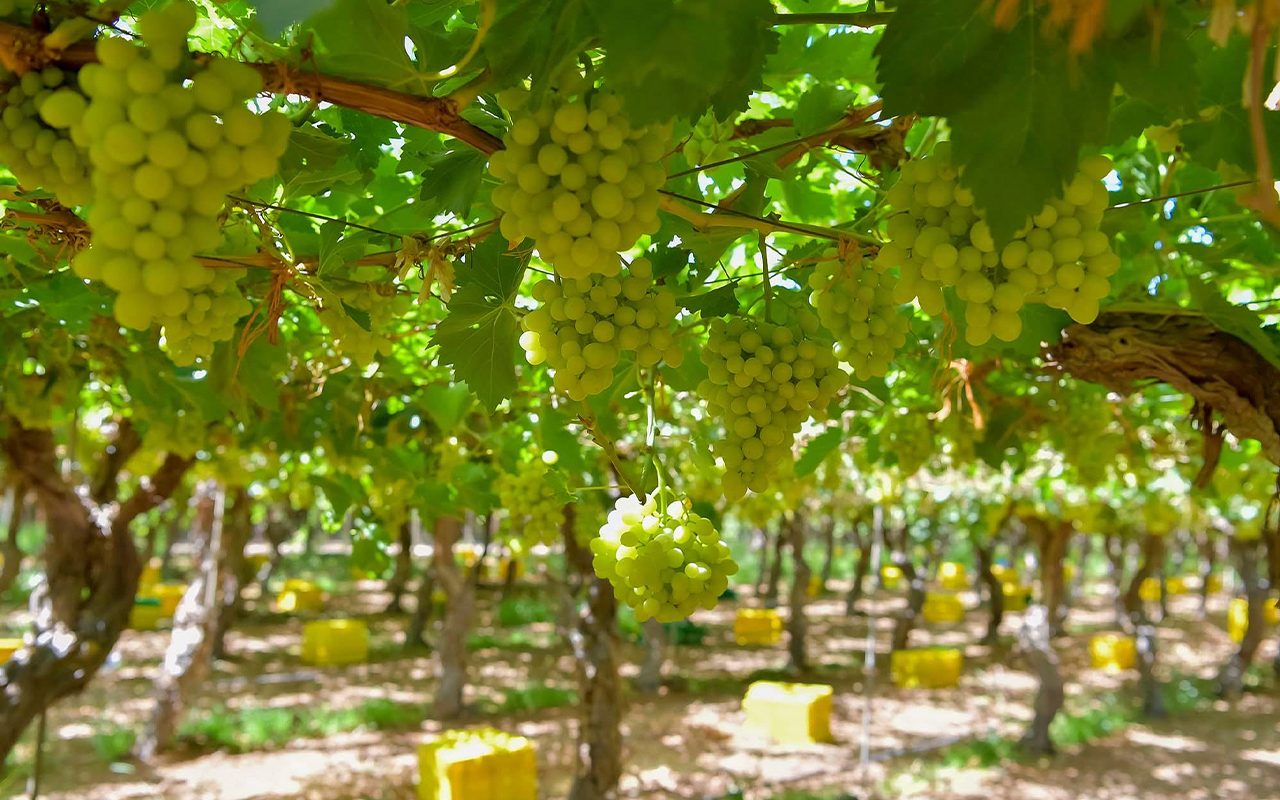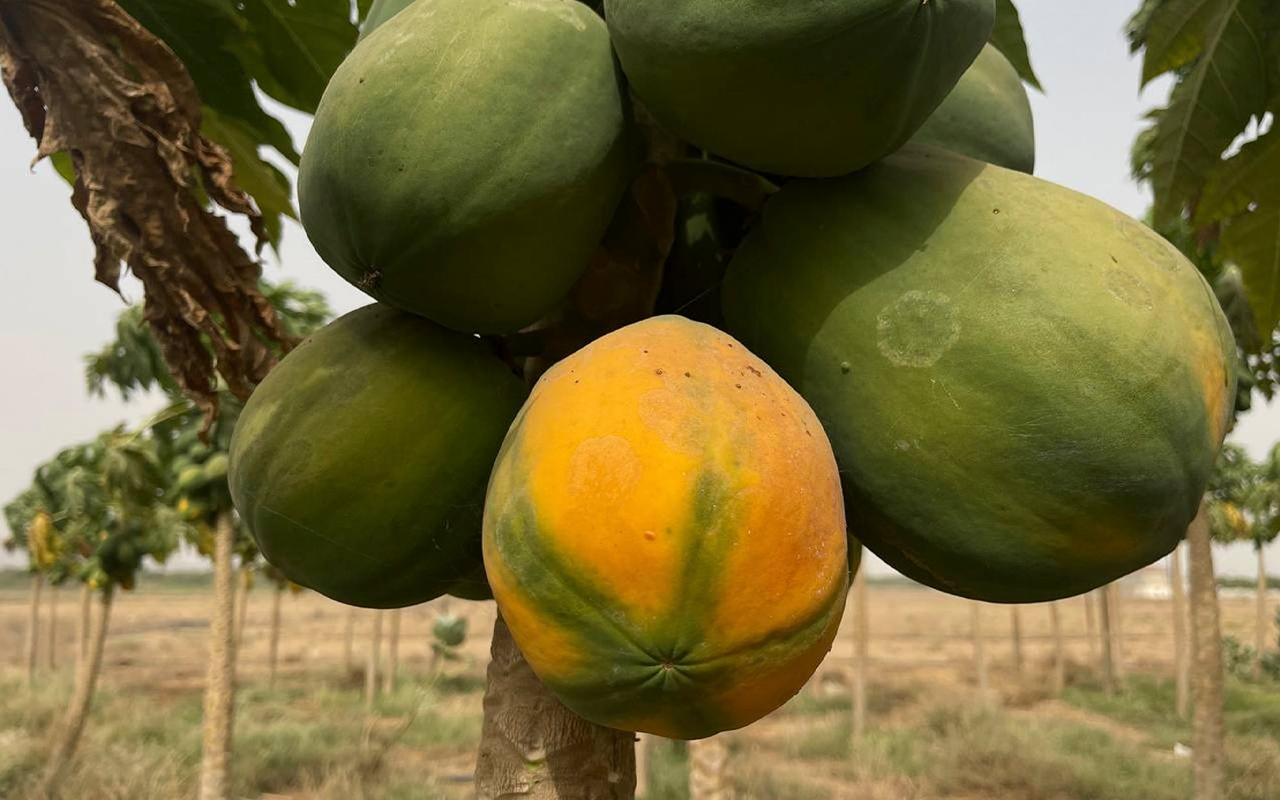Fruit Cultivation in the Kingdom
Fruit Cultivation in the Kingdomof Saudi Arabia involves growing fruits in various environments within the Kingdom. The process starts with planting seeds or saplings of fruit trees and continues until the harvest of crops. The farming methods vary depending on the environment, including soil type, climatic conditions, water availability, and the nature of tree growth.
Fruit production in the Kingdom
The Kingdom produces and exports many types of fruits globally, such as oranges, apples, grapes, pomegranates, mangoes, dates, and watermelon, as well as bananas, lemons, strawberries, and cantaloupe.
The Ministry of Environment, Water, and Agriculture guides local farmers on cultivation methods, fertilization, and irrigation. It encourages them to grow high-quality fruit varieties suitable for different local climates. Additionally, the ministry works with farmers to combat fungal diseases and insect pests affecting crops, improve productivity, and conduct numerous studies and research to enhance agricultural quality.
In 2020, the local production of various fruit varieties amounted to approximately 2.74 million t, with self-sufficiency achieved for certain fruits. Mangoes had a self-sufficiency rate of about 67 percent, with a production of approximately 86,000 t. Cantaloupes reached a self-sufficiency rate of around 82 percent, with a production of about 46,000 t. Dates had a self-sufficiency rate of approximately 116 percent, with a production of 1.5 million t. Grapes had a production of about 117,000 t, achieving a self-sufficiency rate of around 67 percent.
The Ministry of Environment, Water, and Agriculture announced in 2022 that the Kingdom's annual peach production reached 22.2 thousand t, achieving a self-sufficiency rate of 55.5 percent.
Cultivation of fruit trees in the Kingdom
Fruit trees are planted at specific distances for planting locations. They are spaced further apart in regions with moderate summers to ensure that the fruits receive adequate heat and light. Conversely, in areas with intense sunlight and hot winds, the distance between fruit trees is reduced to minimize the impact of the sun and wind.
The planting of grape seedlings in the Kingdom begins at the end of January and ends by the end of February. A hole (pit) is dug to facilitate the planting process, with dimensions of forty x forty cm, spaced according to the grapevine training method. About five kg of humus (organic material) is added to the pit and mixed with the soil, after which the seedling is planted. A wooden stake, approximately twenty-five cm long, is placed next to the grape seedlings for support.
Some grape varieties that are late in leafing, especially in colder regions, can be planted in March. The vines are watered according to the soil's needs without overwatering. During this month, floral clusters appear on early-ripening grapevines. In July, watering is reduced when the fruits begin to ripen until the harvest is complete. Late-ripening grapes are harvested in October.
Farmers continue to prune grapevines to prepare them for fruiting and to extend their lifespan. After pruning, mineral and organic fertilizers are applied directly to the trees. When the vines reach three years or older, about a quarter kg of compound fertilizer 'NPK' is applied in February.
Bananas are planted in January, with the planting hole being one x one m in size. The planting continues until March. In February, humus is added to the soil in the hole, mixed together, and covered. Banana suckers are planted by firmly packing the soil around them and watering lightly to prevent them from tilting or falling. In July, bananas planted the previous year begin to flower. Watering intervals are extended in November, and the land is prepared for new plantings in December.
The Ziziphus spina-christi fruit is well-suited to the climate of the Kingdom and is known for producing abundant crops with fruitful yields. The seeds of the local Ziziphus spina-christi fruit can be planted throughout the year. Typically, the trees flower at the end of September, and the fruit set occurs in October. To prevent the grafted Ziziphus spina-christi trees from being affected by climatic factors such as frost and wind, they are sprayed with a fungicide at the beginning of flowering, before the trees bloom.

Fruit cultivation in the Kingdom's provinces
Jazan Province hosts around four million fruit trees, including five types of tropical fruits: guava, bananas, mangoes, figs, and papayas, with an annual production of about 107,000 t, according to statistics published in 2022. Some of these tropical fruit varieties were introduced to the region in 1982. Jazan Province possesses agricultural resources and climatic factors that facilitate cultivation and production.
In al-Bahah Province, various fruits are cultivated, including pomegranates, grapes, figs, and olives. Most of these fruits are planted between February and March, but they have different harvest times. Pomegranates are harvested from August to September, grapes from July to August, figs from June to July, and olives from September to November
In Aseer Province, various types of grapes are cultivated, including those grown in France, Italy, and Jordan, as well as the local grape varieties. Summer fruits are also grown in the mountainous areas of Aseer and are exported to other provinces.
The Tabuk Province is renowned for cultivating pears, with approximately fifteen thousand pear trees producing around 750 t annually. The peak production period for pears is in July and August. The region benefits from fertile soil and abundant underground wells. Additionally, Tabuk is home to around fifty-five thousand fig trees.
In Taif Governorate, many agricultural crops are cultivated, with one of the most famous being prickly pear, which has an annual production of approximately 1,200 t. In al-Jawf Province, various types of fruit trees are grown, such as peaches, apricots, plums, figs, grapes, apples, pears, watermelon, cantaloupe, and other varieties, with the region's total production exceeding 170,000 t annually.
In Qassim Province, various types of fruits are cultivated, including pomegranates, lemons, local apples, mangoes, berries, peaches, and guavas. In 2021, the fruit production in the region reached approximately 109,000 t, thanks to the area's fertile soil and abundant groundwater.
The total olive production in the Kingdom reached approximately 358,000 t, spanning across various provinces, including al-Jawf, Riyadh, Qassim, the Eastern Province, Makkah al-Mukarramah, and al-Madinah al-Munawwarah. Meanwhile, the production of perennial fruit trees such as mangoes, pomegranates, grapes, and lemons reached approximately 770,000 t.

Fruit nurseries in the Kingdom
Seeds of some fruit varieties are planted in nurseries starting from January, such as apricots, peaches, and almonds, to produce seedlings for grafting. Also, deciduous fruit seedlings are transplanted in this month as it is considered a suitable month for doing so, as evergreen fruit seedlings can be transplanted and planted in their permanent location.
Fruit nurseries work on planting seeds, nurturing and pruning plants, removing weeds, and managing irrigation, fertilization, and weeding according to the appropriate months for each type of fruit.
The Ministry of Environment, Water, and Agriculture guides local farmers on cultivation methods, fertilization, and irrigation. It encourages them to grow high-quality fruit varieties suitable for different local climates. Additionally, the ministry works with farmers to combat fungal diseases and insect pests that affect crops, improve productivity, and conduct numerous studies and research to enhance agricultural quality.
The ministry has also provided guidance on the spacing between fruit trees for planting, suggesting specific distances for certain varieties. These include planting pear trees four to six m apart, peach trees five to seven m apart, apricot trees five to six m apart, pomegranate trees four to five m apart, and date palm trees approximately seven to eight m apart.
In 2021, the Ministry of Environment, Water, and Agriculture launched the campaign "It Is Their Season" to raise awareness about locally grown seasonal and diverse fruit varieties. The campaign aimed to encourage the community to consume agricultural products to achieve self-sufficiency, support farmers, strengthen food security, create job opportunities, and spread knowledge about the quantitative and qualitative development of local agricultural production.
The Kingdom worked towards achieving self-sufficiency in the production of strawberry and black mulberry seedlings by the end of 2023. This was accomplished through the development of tissue culture propagation protocols by attracting specialized scientists. The goals were to increase agricultural yields, reduce the import of commercial plant seedlings, increase the percentage of non-oil local content, and localize the technologies used in agriculture.